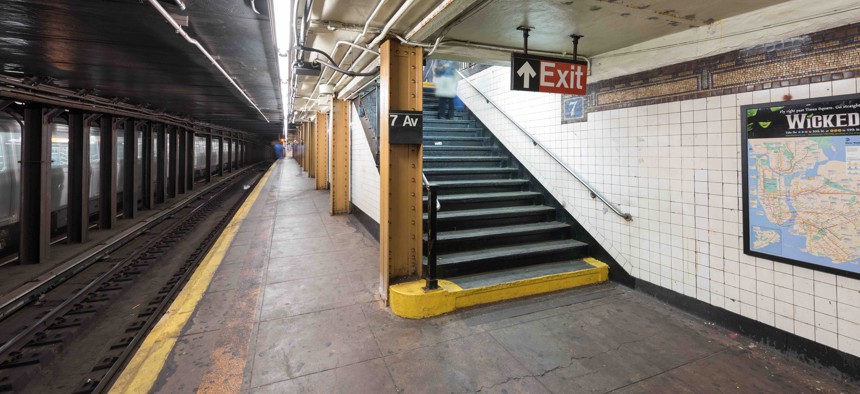Federal Judge Rules Against Transit Agency in Disability Access Case

Shutterstock

Connecting state and local government leaders
The dispute centers on requirements for elevators at subway stations.
Disability rights advocates pressing for more elevators at subway stations in New York City scored a win in federal court this week.
A district court judge ruled that renovations the Metropolitan Transportation Authority made at a subway stop in the Bronx should have forced the agency to consider installing elevators at the station under guidelines in the federal Americans with Disabilities Act.
The groups and individuals that brought the case say in court filings that less than a quarter of stations in the city’s subway system are fully accessible to people with disabilities, which is low compared to other major U.S. cities, like Washington, D.C. and San Francisco.
“If MTA had been complying with the ADA over the past twenty-five years by installing elevators when it performs station renovations, we would be closer to full accessibility today,” said Michelle Caiola, one of the lawyers who represented the plaintiffs in the case.
The group she works with, Disability Rights Advocates, predicts the ruling will lead to more elevators getting installed in the city’s subway.
Accessibility issues in the city's transit system drew attention in January when a 22-year-old woman died after falling down a flight of subway steps while carrying her daughter in a stroller. The Manhattan station where that incident occurred did not have an elevator.
MTA's chief external affairs officer, Max Young, said in a statement on Wednesday that the agency is “steadfastly committed to improving access throughout the subway, with a hard and fast goal of making 50 additional stations accessible over five years."
"We’re not wavering from that commitment," he added.
But the agency also says there were technical roadblocks to installing an elevator at the station that is the focus of the court case.
The legal dispute stems from a nearly $22 million renovation project carried out over about seven months in 2013 and 2014 at the Middletown Road station on the 6 line, which serves the northeast section of the Bronx. This work involved repairing and replacing infrastructure like floors, walls, lights and staircases.
In 2016, two nonprofit groups and two disabled individuals, including a person who uses a scooter and another who uses a wheelchair, filed a lawsuit alleging Americans with Disabilities Act violations.
During the course of the case the U.S. government intervened, siding with the plaintiffs against the MTA.
On Tuesday, a federal district court judge, Edgardo Ramos in the Southern District of New York, ruled in favor of the nonprofits and disabled individuals.
His ruling centered on conflicting cross-motions for summary judgement.
He explained that the parties in the dispute agreed the only issue to be resolved by the court on the motions was which of two sections of the federal disability law applied to the work at the Bronx subway stop.
The plaintiffs claimed the renovations triggered a section of the law that would require the MTA to make accessibility upgrades “to the maximum extent feasible” regardless of the cost.
The agency countered that the renovations fell under part of the statute that would require upgrades like the elevator installation only if the cost is not “disproportionate" to other project expenses.
Ramos ruled that the part of the law that the plaintiffs cited applied. “The Court finds that Defendants’ renewal project, which involved the replacement of the stairways at the Middletown Road Station, clearly met this condition,” he wrote.
An MTA spokesperson said in an email that, from an engineering perspective, it can be infeasible to include new elevators in all station renovations and that the agency advised accessibility advocates prior to the lawsuit that this was the case with Middletown Road.
"Following completion of discovery," the spokesperson added, "the court will now need to address the technical infeasibility concerns that MTA identified years ago as impeding elevator installation."
This story has been updated to include a response from the MTA.
Bill Lucia is a Senior Reporter for Route Fifty and is based in Olympia, Washington.

NEXT STORY: Why Eating Roadkill Makes Roads Safer for People and Animals





